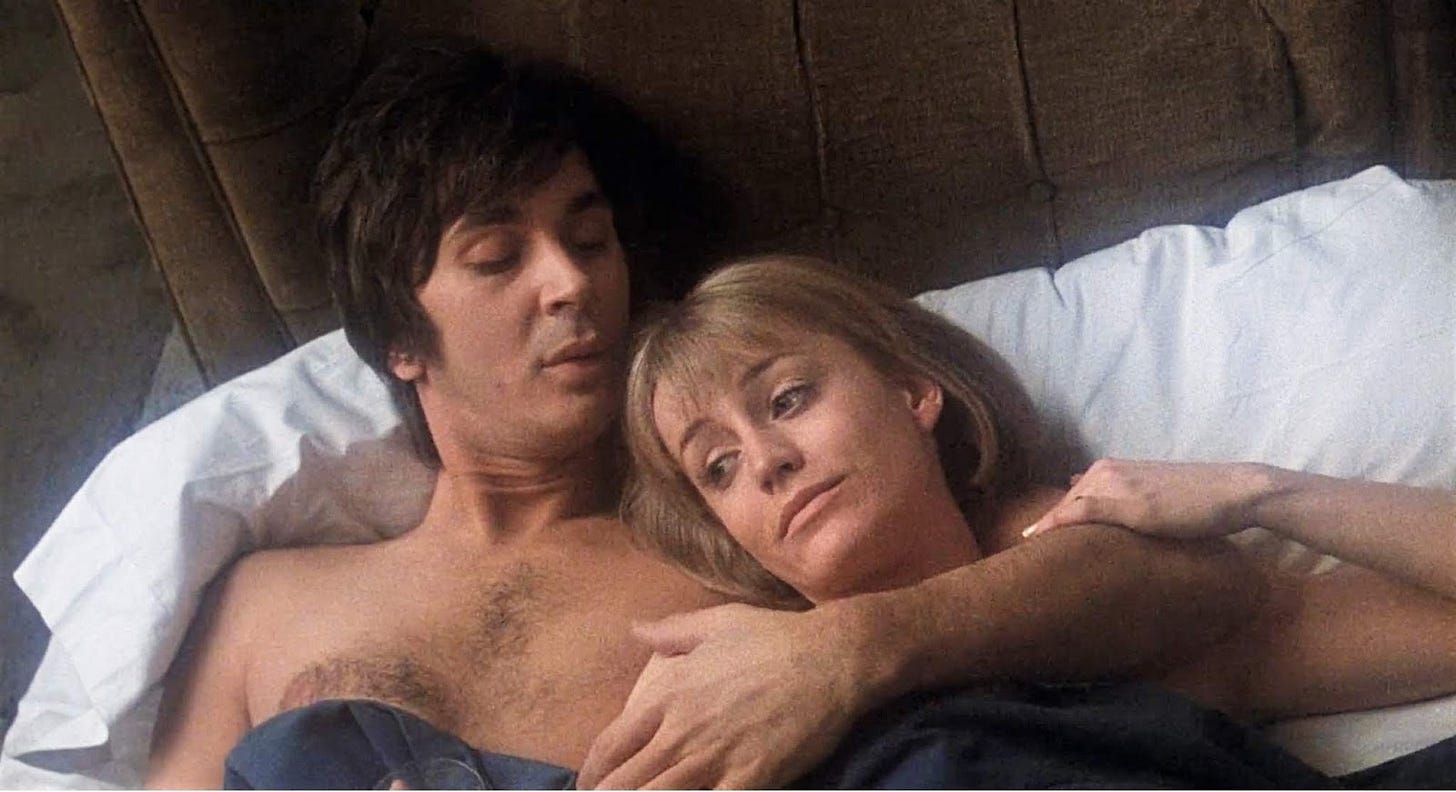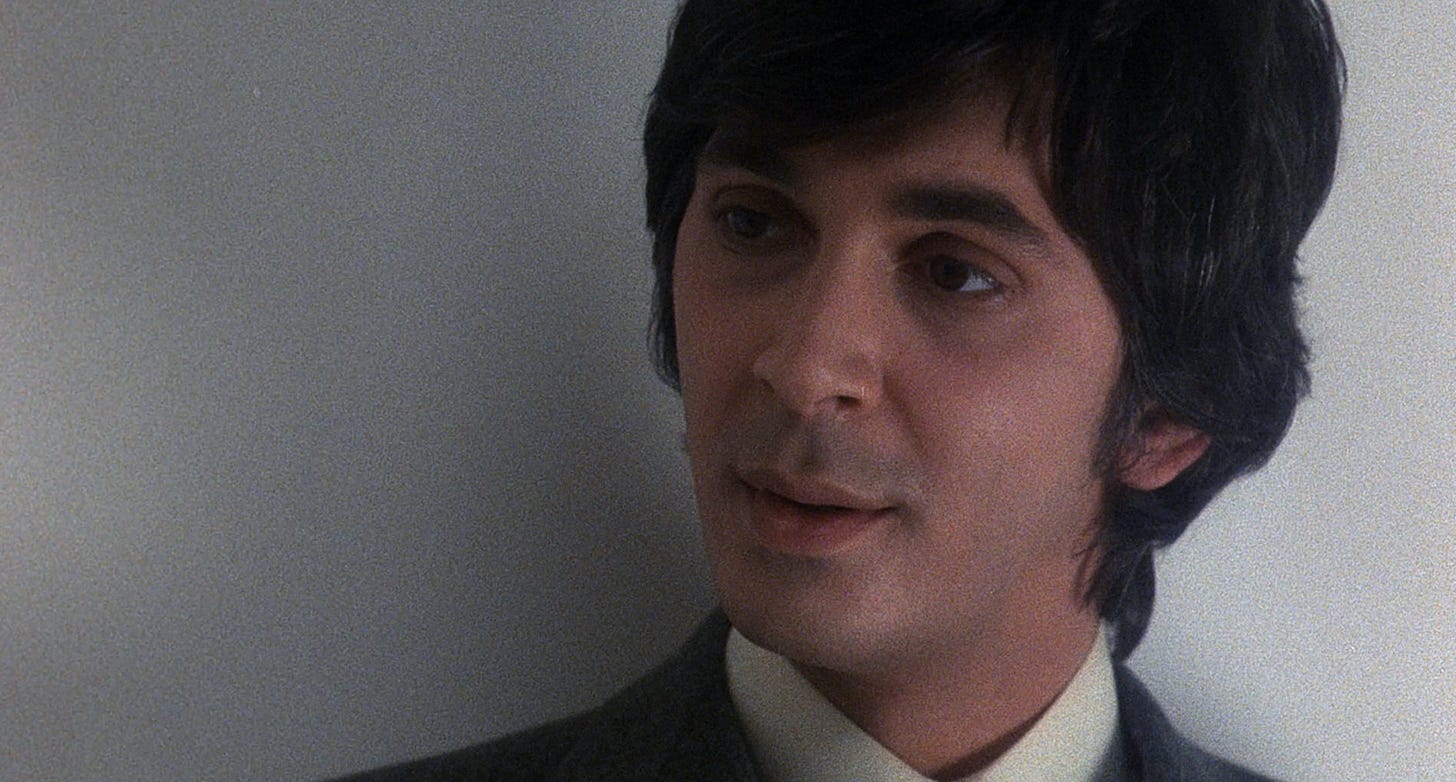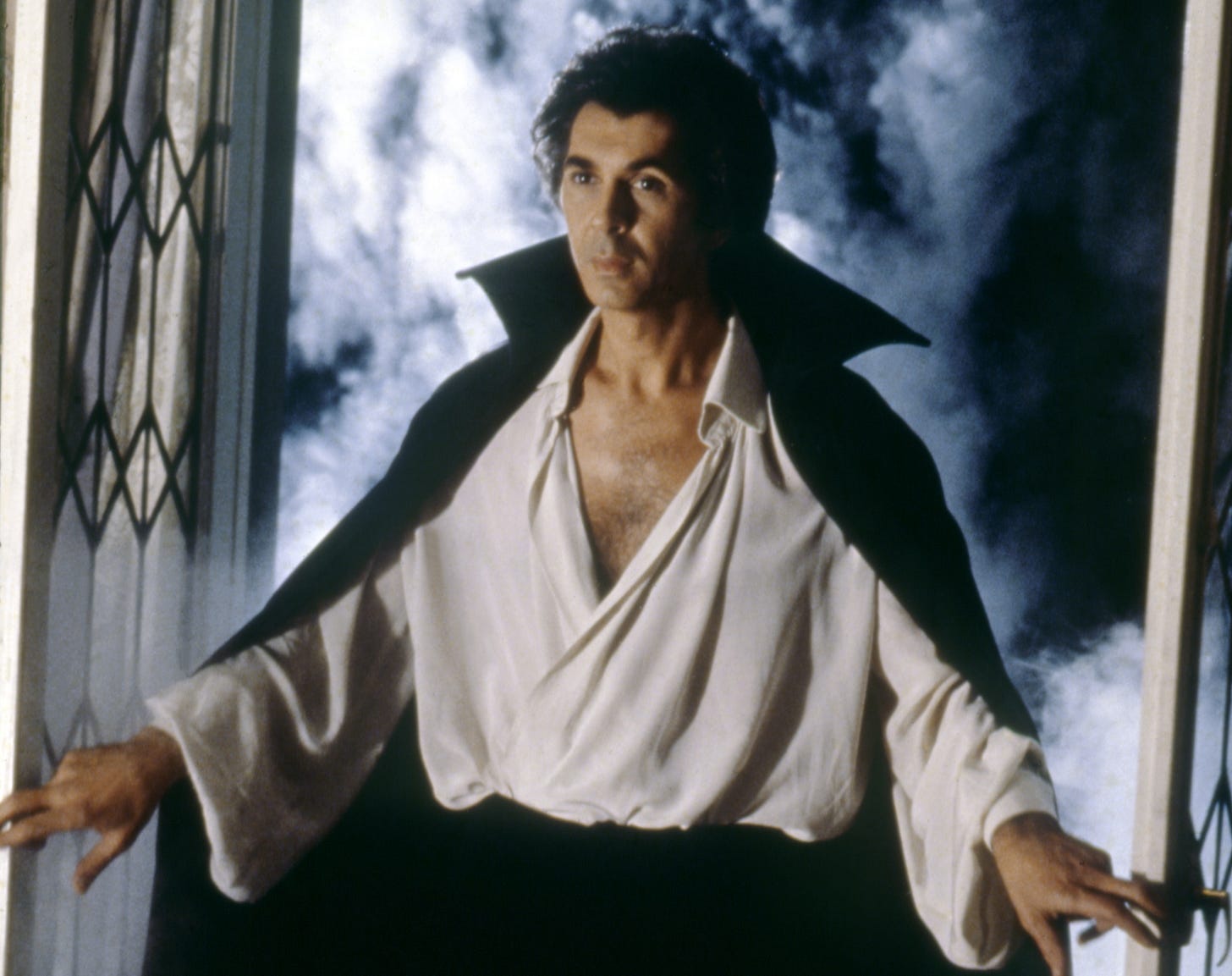Eleanor and Frank Perry were indie before anyone else. In 1962 they self-financed their debut film, David and Lisa, and both earned surprise Oscar nominations. From there they specialized in literary adaptions for the studios. In films like The Swimmer, Eleanor, the playwright, knew exactly what to respect in the source material and what to change. Frank, the director, could push film style to almost reckless levels of originality. Diary of a Mad Housewife is their best, most personal, and also their last film together. Based on the novel by Sue Kaufman, it stars Carrie Snodgrass as Tina, suffocating under the weedy tyranny of her New York lawyer husband played by Richard Benjamin. Her life changes when she meets a beatifically coiffed literary star played by Frank Langella.
Diary of a Mad Housewife is a cringy, hilarious, cruel, and sexy 90-minute stew of New York angst, horny writers, and needs both met and unmet. The perfect partner for this Cinema Dirtbag commentary track was, of course, Emily Schultz, as her new novel is literally called Sleeping With Friends and is a mystery set among friends who survived the Indie Sleaze era of Brooklyn. As our talk reveals, many of the issues wrenched open in this 1970 film are still very much in play fifty years later.
Brian J Davis: I’d like to open with a public service announcement. The writing and directing couple who made this movie, the central message of which is “adultery is awesome,” divorced one year after its release.
Emily Schultz: I didn’t even notice this opening shot the first time. Her wedding ring is featured in the middle of the frame.
BD: Richard Benjamin, the worst husband in film history! I’ve seen cannibal horror movies less repulsive than him.
ES: He is so frightening from the first moment in his little shaving towel.
BD: And let us be specific here. Richard Benjamin’s choice in playing his character this way is utterly brave and one of the most astounding performances I’ve ever seen. Being unlikable is true acting bravery.
ES: We need to mathematically calculate the number of insults to his wife he manages to fit in this opening scene.
BD: Between her waking up and having her “at least I have this cigarette” cigarette, it’s at least twenty putdowns.
ES: DTMFA did not exist then.
BD: It was not a legal concept in 1970. But let’s not position this in the past. It amazes me that with all the choices now available, people still have husbands. Like, in terms of the cost/benefit, we can only reach for so many things on high shelves.
ES: This is what this movie does so well. This portrays him as so overtly hostile —
BD: To the point where it is almost an alienation effect. Benjamin plays it so deadpan too.
ES: Whereas the reality is men in long term relationships will be more ambiently hostile. But here the theatrical effect proves the point.
BD: Carrie Snodgrass doesn’t say a single word for so long but we feel everything she feels.
ES: I also like how they show the children watching and absorbing all of the relationship habits.
BD: The children are copying him and I hate the children too! They’re so evil.
ES: He’s teaching them everything.
BD: The editing is almost contemporary given how propulsive the pacing is. It’s redundant to say movies are made in the editing suite—they all are. But this one I suspect really was.
ES: So much happens just in the credits sequence showing her routines.
BD: And none of it matters to him. Richard Benjamin opens his mouth and it’s like being stabbed! Now they’re heading to Elaine’s and they look like such poseurs. She knows it. He doesn’t. This is how fire this movie is. The Swimmer captured suburban alienation, without mercy. This movie turns the camera on the Perrys’ own elite world in New York, and all the striving schnooks and persevered rich. Watching this movie, I’ve never been happier to have been born poor.
ES: The negging in this movie. It tried to warn to us.
BD: The loft party. This is where it becomes like an east coast version of Bob & Carol & Ted & Alice. And the band at the party is Alice Cooper! I suspect you were always disappointed in how much I love early Alice Cooper, but it’s a Detroit thing.
ES: Wait. My heart stopped! 1970 Frank Langella is here.
BD: He’s either supposed to be Norman Mailer or Philip Roth. I’m leaning towards Philip Roth. Regardless, Italian Americans should have a parade purely celebrating Frank Langella’s hair.
ES: Pause the movie and tell your Philip Roth story.
BD: Jesus. That story. Okay. It’s the Chelsea Hotel lobby. 2009-ish. I’m sitting there and across from me on the opposite couch is Philip Roth. Just like a dust jacket, and he is staring at me, so intensely. His eyes are burning with a mix of what looks like hatred and lust. And I’m thinking Is septuagenarian Philip Roth cruising me? Could be? That old dog. Hey I guess I still got it! And I tell that story to everyone for the following ten years, exactly like that. But then one day I realize: Oh…Emily Schultz was sitting next to me, and—given what we know—Philip Roth was probably checking her out with a mix of hatred and lust.
ES: I was looking at my phone through all the hatred and lust. Frank Langella is back. Thank God. I could happily Google image search 1970s Frank Langella all day.
BD: From what Carrie Snodgrass says to him, I’m going to say he’s better at picking up women than writing books.
ES: This is why we love her in these scenes. She’s forthright and honest with him in a way she can’t be with her husband.
BD: Because he is profoundly not listening to her and she has totally shut off.
ES: Damn, Frank Langella is sexy as hell.
BD: Notice he never sits like a normal human. He’s on the floor or he’s draped across the top of couches and end tables.
ES: He definitely is using a curling iron on those bangs.
BD: But a man’s curling iron, right?
ES: Cut back to Richard Benjamin. Just the way he says her name. Tinnnaaaaa!
BD: He captures how you can hate your own name depending who’s saying it.
ES: He’s so good at being an asshole. He can make a food request insidious.
BD: It’s so good it definitely typecast him for the early ’70s. Going from this to The Last of Sheila.
ES: This film is set from Halloween to December?
BD: And it flies thanks to the editing. They rush through the tedium of her life in a blur but then time stops during her affair scenes.
ES: Well, that is what it feels like. Oh, wait. Frank Langella “doesn’t talk about his work.” I should try that!
BD: The sex scene is interesting. This is a studio film and these shots are right out of Euro softcore. It shows how the studios at the time were actually terrified of adult films going mainstream and had to allow it into their films.
ES: I just checked. Frank Langella is six-foot-four.
BD: Big Langella Energy.
ES: They’ve only had sex for the first time and he asks, “Does it have to be love?” He’s already worried about attachment.
BD: By the end you realize that both he and Carrie Snodgrass are incredibly starved, and that’s why they spark. And another amazing thing you realize is that this story, the affair, is her real story. Her real interior life. It’s where we learn who she is, while her husband and kids are like screaming cartoons.
ES: And that’s because Langella enjoys her. Observing her, and learning who she is.
BD: But then she disses his writing. Big fight!
ES: “How are you a writer and a coarse and vulgar clod?” Busted!
BD: Something you only learn when you date a writer. Now they’re negotiating the rules. Waiting one week before talking. So Bushwick and poly!
ES: These makeouts really seem natural.
BD: I don’t like to diminish actors’ craft by contemplating whether they really hooked up or not…but I’m going to say Langella and Snodgrass definitely hooked up.
[Emily laughs at Richard Benjamin then gasps for air]
BD: Are you going to pass out every time he says “Roll in the hay?”
ES: It gets more demented every time he says it. “Rrrroll in the haaaayyy!”
BD: It’s like he’s poisoning her slowly…but with words.
ES: This edit. It’s startling. She’s talking about her feelings. Her husband demands she go to bed, and then the jump cut to her and Frank Langella.
BD: But then he makes fun of her for having gone to Smith, then she Smith-slaps him!
ES: That’s the difference. She can fight back with him. She can’t with her husband. Oh my God, Frank Langella looks like a giant next to her. Sitting, again, on top of a chair. I don’t even like tall but…
BD: She gave him a black dressing robe. It’s Langella-as-Dracula foreshadowing!
ES: Every worry he had comes true though. She does become possessive of him.
BD: And he turns cruel, like her husband.
ES: That’s why I wanted him to accept her invitation to her and her husband’s party. It’s not necessarily that I want them to be together at the end, but because the Perrys are side-stepping the drama that’s organic to the story. Snodgrass and Langella met at a party so they should end their relationship at one. It wouldn’t even need to be a big scene. It could show them acting like strangers in her house.
BD: My one criticism of the movie is the fight dialogue. They’re all theater fighting in complete sentences. No one does that. It only happens on stage and it’s kind of creaky even in 1970. And now she’s telling off the gossipy old actress.
[Both] “Rotten little bitch.”
BD: Three women that Frank Langella has slept with in one room? That’s why he’s not at the party.
ES: What’s the largest number of people that you’ve slept with that were at a party together?
BD: I was about to ask you that same incredibly private question in a public forum.
ES: For me, three.
BD: Four. And it was tough. Especially as I had just slept with all of them that morning.
ES: What!?
BD: Just kidding about the last part. Now Frank Langella is breaking up with her. But she ends up breaking up with him! I love how some people can pull that trick off. I never could.
ES: She can’t leave her husband but she can break up with her lover. It’s the one power she has.
BD: Let’s talk about the ending a little early. On first viewing you were angry with that smash cut to the group therapy scene. Was it the cut or the idea?
ES: I feel the characters—okay, the husband—didn’t get what they deserved.
BD: Narrative always has a politics of its time. This is 1970. Things were very much: no more tidy endings. The Graduate hangs pretty heavy over this movie. But I do want to point out that Richard Benjamin confesses his own affair and she keeps hers secret and smiles like a saint, making him feel worse. That’s my girl!
ES: You know why she did that? She doesn’t love him so the truth doesn’t matter.
BD: And now you get one more “roll in the hay?”
ES: He’s offering divorce. Why won’t she say yes?!
BD: And now the smash cut to group therapy. There are five New Yorkers inside of you. The one you starve and the four you feed just to shut them up about parking.
ES: I love this movie. I hate this ending.
BD: Diary of a Mad Viewer! I love this ending. This is what goes through your head as you figure out a relationship. You invent fake people yelling and blaming you. I do anyway.
ES: The women are telling her to leave. The men are telling her to stay. That’s funny. That’s true. It’s interesting. But not as a last scene. And even given what you said about 1970s ambiguity, I just wanted to see Richard Benjamin slapped. Once!
BD: But Tinnnaa!
ES: Tinnnnnaaaaaaa!
Buy Diary of a Mad Housewife | Not available for streaming






